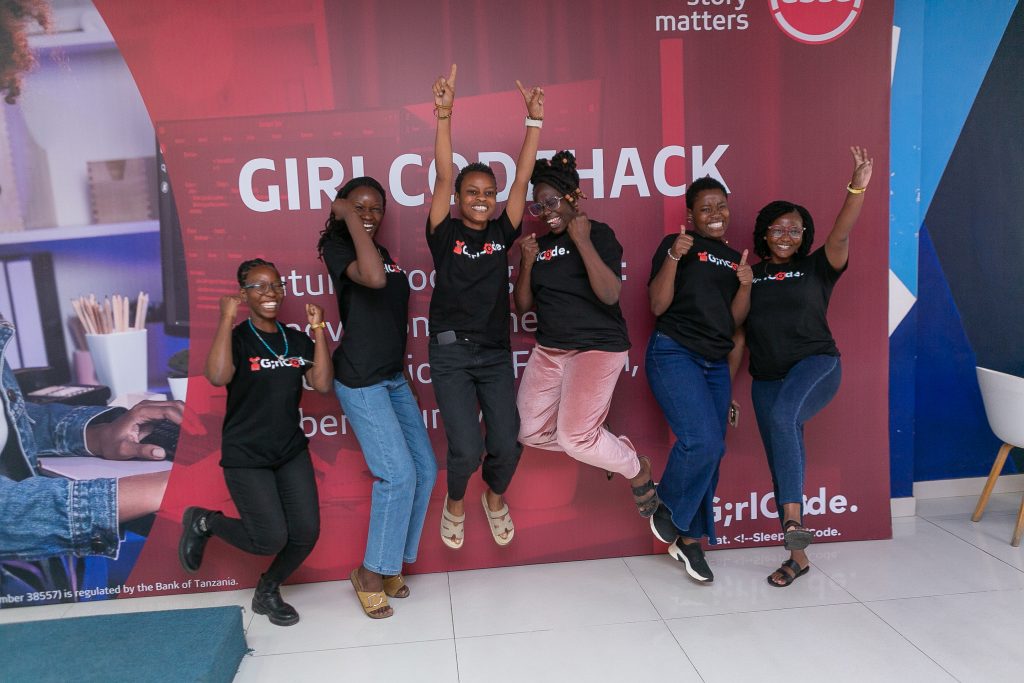
The 11th annual GirlCodeHack united young women from eight African cities Johannesburg, Cape Town, Durban, Nairobi, Kampala, Dar es Salaam, and Gaborone for a 30-hour hackathon that celebrated cross-border collaboration and the power of diverse perspectives in shaping technology.
Building on its legacy of empowering women in STEM, this year’s event carried the theme “Future-Proofing Africa: Innovation at the Intersection of FinTech, Cybersecurity, and AI.” Through this lens, participants gained hands-on experience while developing practical solutions to some of the continent’s most pressing digital challenges.
Celebrating Innovation Across South Africa
Across South Africa, the hackathon highlighted a wave of creativity and collaboration. Participants in Johannesburg, Cape Town, and Durban showcased how local innovation can drive Africa’s digital and economic transformation.
From Johannesburg, Team TechGurlies captured attention with FinLit GPT, a project designed to combat youth debt by promoting financial literacy and empowering young people to make informed money decisions. The team comprised Nombali Mafa and Skyler Suru.
Moving south to Cape Town, Team Ndlela developed AI Career Coach, an intelligent platform that helps users navigate career planning and upskilling through personalized, AI-driven guidance. The team included Awonke Ntshonga, Zoë Bulle, Khanyisa Hebe, and Khanyisile Sefalane.
Meanwhile, in Durban, CyberShield Africa unveiled Rural Cyber App, a tool designed to enhance cybersecurity awareness in rural communities. By focusing on digital safety education, the team Keemiya Chetty and Ishta Mahadew sought to bridge the cybersecurity knowledge gap across underserved areas.
Grand Prize Winners from Tanzania
Extending the competition’s continental spirit, the grand prize of R100,000 went to Tokiva Sisters from Tanzania for their groundbreaking solution, PayNest. The biometric budgeting and payment app consolidates multiple wallets including bank and mobile network operator accounts into a single, secure system. By using biometric authentication, it helps users plan, pay, and manage their finances safely and efficiently.
The winning team included Saraphina Mtonyole, Pendo Apolinaly Holela, Beatrice Alfred Benedict, and Maryam Mohamed.
“Tokiva Sisters impressed with a forward-thinking solution aimed at empowering young people to take charge of their finances,” said Zandile Mkwanazi, founder and CEO of GirlCode. “Their creativity, skills, and dedication despite long hours demonstrate the remarkable talent young women are bringing to tech. It’s exciting to see how their project can make a tangible real-world impact.”
The Power of Inclusive Innovation
Further reflecting on the event’s success, Tamu Dutuma, Head of Strategy and Transformation at Absa Regional Operations, praised the diversity of thought that emerged throughout the hackathon.
“It was truly inspiring to witness how participants tackled the same challenge from diverse angles, each bringing fresh insights and bold, innovative thinking. This is the power of inclusive innovation,” Dutuma said. “At Absa, we believe empowering women in tech is not just a value but a catalyst for meaningful change across Africa’s tech landscape.”
Empowering African Women in Tech
As GirlCodeHack expands its reach across the continent, its mission remains clear to ensure young women are equipped and empowered to participate fully in Africa’s growing digital economy.
According to Mkwanazi, this year’s hackathon demonstrated how collaboration can drive innovation and personal growth.
“Young women shared ideas, learned from one another, and developed solutions addressing real challenges,” she explained. “We saw them building skills, confidence, and networks that will endure long after the event.”
She also emphasized that representation and safe spaces remain at the core of GirlCode’s philosophy. When young women can see and engage with leaders who have overcome similar challenges, it strengthens their confidence to pursue their own goals.
Corporate Partnerships Driving Change
Transitioning from vision to impact, corporate partnerships play an essential role in GirlCodeHack’s continued success. Mkwanazi credited organizations such as Absa Bank, Vumatel, MTN, NinetyOne, iKhokha, Orange Cyberdefence, VML, Mint Group, SAP Fioneer, Entelect, and Old Mutual for not only providing financial backing but also offering mentorship, internships, and career opportunities.
“Investing in young women’s skills is investing in Africa’s future,” Mkwanazi added. “Every project developed, and every opportunity provided at GirlCodeHack helps build a generation of tech leaders ready to tackle the continent’s most pressing challenges.”
Building an Inclusive Digital Future
Closing the event, Vuma, South Africa’s leading fibre network operator and one of GirlCodeHack’s key partners, reaffirmed its commitment to empowering women in technology and broadening digital inclusion.
“At Vuma, we believe that true digital progress happens when everyone has the opportunity to shape it,” said Simon Butler, Chief Commercial Officer at Vuma. “GirlCodeHack demonstrates what’s possible when young women are given access, mentorship, and a platform to innovate. Africa’s digital future is in capable hands diverse, inclusive, and bold.”

